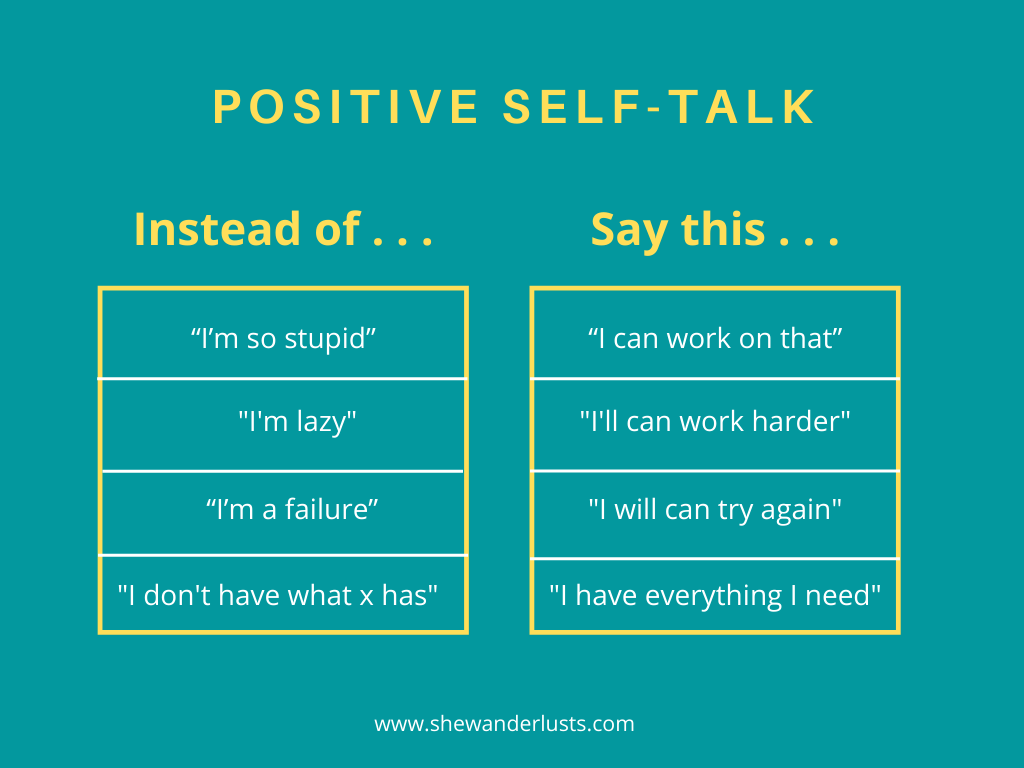
How to Show Yourself Grace Today
Why is giving yourself grace so damn hard? It’s probably because you know yourself better than you know anyone else. You are keenly aware of your flaws and your blunders. So naturally, when things go awry, you begin to feel inadequate and are hard on yourself. But no one is perfect. So it’s imperative to show yourself grace just as much as you do for others. There are numerous ways to do this. Here are seven:
1. Speak kindly to yourself
Everyone engages in negative self-talk (e.g. “I’m so stupid”, “I always mess up”, “I’m not pretty enough”, “I’ll never have X”). In fact, barring toxic environments, most negative remarks that you hear about yourself probably come from yourself. This is extremely unhealthy. It’s destructive to your confidence and limits your ability to reach the height of your potential.
When you’re tempted to engage in self-critical talk, show yourself grace and try to self-reflect. Self-reflection is an observational, non-judgmental process. It requires you to: (1) take the time to observe what went wrong; and (2) think about what you might do differently next time.
For example, if you’re on a weight-loss journey and one day you eat excessively, you might become self-critical by saying something like, “I’m a failure” or “I’ll always be fat.” Instead of doing this, give yourself grace and try to figure out why you ate too much. Maybe you cut down calories too quickly. Perhaps you were celebrating an event. Or maybe you just wanted to each more that day.
Once you determine the reason, you can decide what you’d do differently next time and engage in productive self-talk. For example, you may say: “weight loss is a marathon not a sprint”; “it’s okay to start over”; or “I can still do this.”
Using a self-reflection process can bolster your confidence, self-esteem, and productiveness. This will not happen overnight. But with daily practice, you will eventually notice drastic changes in your thought process. When you have trouble talking to yourself kindly, try to imagine you’re talking to someone you love and ask yourself, “would say I say this to them?”
Another way to engage in more positive self-talk is to come up with alternative phrases ahead of time. Here are a few examples:
Pin It

2. Don’t compare yourself to others
You’ve probably heard time and time again that you shouldn’t compare yourself to others. But, the fact of the matter is social comparison is a fundamental human impulse. So we cannot simply stop doing it. Besides, not all comparison is bad. Sometimes social comparison can improve your life. For example, upward comparison—which occurs when you compare yourself to someone you perceive as superior—can improve your life by showing you that something is possible or motivate you to make positive changes in your life. Downward comparison—which occurs when you compare yourself to people who are worse off than you—can make you grateful for what you do have.
That said, comparison is accurately described as the thief of joy because it can trigger feelings of envy, self-doubt, dissatisfaction, or superiority. For instance, when you make upward social comparisons, you may find yourself dissatisfied with your life. And, when you make downward social comparisons you may find yourself coming off as conceited or arrogant. Not only can this create a lot of stress in your personal relationships, it can also create unnecessary internal turmoil.
That is why it’s crucial to untether yourself from negative comparisons. You can do this by showing yourself grace and by doing these four things:
- Compare yourself to your past self. The person you were yesterday should be your one and only competitor.
- Figure out what’s making you unhappy. Sometimes unhappiness manifests itself in making comparisons. So figure out what’s causing your discontentedness and start making the changes that will make you satisfied with the life you’re living.
- Be grateful. When we compare ourselves to other people we often forget our own blessing. It’s essential to show gratitude for the things you do have rather than the things you don’t have. Also, take note of the things that go right in your life on a daily basis.
- Remember that perception is generally not reality. When you negatively compare yourself to others you are just wasting time because you have no idea if your perception of another person’s life is accurate. Moreover, unhealthy comparisons do not benefit your life in any way. To the contrary, they merely distract you from living your life and from making the changes that will make you happy.
3. Celebrate yourself
Do you devote a lot attention to your failures rather than your successes? If so, you’re not alone. As humans we tend to laser focus on our disappointments rather than our triumphs. Perhaps this is because we were never taught to regularly celebrate ourselves. Whatever the reason, we don’t take enough time to celebrate ourselves. And, if you’re like me, when you do finally decide to celebrate yourself, you may feel guilty. I’m working on this, and I encourage you to do the same.
Celebrating yourself can have several positive effects. It reminds you to enjoy the journey; boosts your confidence for the next task; increases your feelings of joy and satisfaction; and reduces you need for outside approval.
So start celebrating yourself. Start acknowledging when you’ve done a job well done. Don’t get caught up in achieving things. Celebrate your actions even when the result is unfavorable. Do more of what you love and find joy with the best moments of your day.
Pin It

4. Let Go
To give yourself grace is to “give permission to forgive your mistakes, lapses in judgment, and hurtful behavior, because no one is perfect.” We all have that one thing (or multiple things) we believe would have turned out differently if we had chosen an alternative path. But it’s important to stand in the decision you made without hindsight and to be confident in the reasons you made them at the time.
5. Allow yourself to rest
Growing up we were taught that you earn what you work for and that successful people work the hardest. This is often true. But what we tend to forget is that hard work and overworking are not synonymous. Overworking is often glamorized, but there’s nothing glamorous about it. In fact, overworking can take a serious toll on your mental and physical health.
So it’s imperative that you allow yourself rest. I’m not saying quit your job or to stop working hard. I’m simply saying that its okay to show yourself grace by taking a break. Whether it’s an hour, a day, or a week, your mind and body will thank you.
6. Show gratitude
Another way to show grace to yourself is to simply be grateful. Direct your attention to the good rather than the bad. There’s no wrong or right way to do this. You can get as creative as you want. Here are a just a few ideas on how you can practice gratitude:
- Create a gratitude jar – every day write down things you are grateful for on a strip of paper and place it in a jar. Whenever you need a reminder of your blessing, retrieve a piece(s) of paper from the jar and read it silently or aloud.
- Make a gratitude journal – purchase a journal or a notebook solely dedicated to your expressions of gratitude. You can write in it whenever you want. But to be effective, I’d recommend writing in it at least once a day and no less than once a week.
- Come up with a gratitude mantra – Create a gratitude mantra or chant that you can say out loud or silently to yourself in meditation or whenever you need it.
- Express three things you are grateful – Everyday come up with three things that you are grateful for. I personally prefer to do it when I wake in the morning and when I go to bed at night. Doing it in the morning is refreshing and allows me to start my day on a good note. I find that doing it at night—right before bed—is very calming and reassuring.
7. Reassess and manage your expectations
Many times our feelings of disappointment are self-imposed due to unrealistic expectations we’ve placed on ourselves or others. These expectations a generally stem from perfectionism. If you find yourself setting high and unrealistic expectations, it’s important to stop.
I’m not suggesting that you stop setting standards for yourself. But, if you’re expecting too much from yourself, take a step back and show yourself grace Reassess your expectations and make sure they are realistic and provide space for growth and opportunity. This is will result in a more relaxing environment and more contentment in your life.
I hope that after reading this article, you choose to give yourself grace. It’s won’t be easy, but it can be done. Just remember nothing shines 24 hours a day, not even the sun.
Pin It

How will you show yourself grace today? Let me know down in the comments.
If you enjoyed this article you may enjoy my most recent article about perspective during tough times.




4 Comments
Anika
This was really uplifting to read, I especially love the positive talk graphic, that’s something to save for the future. What a lovely post, thank you for sharing!
Anika | chaptersofmay.com
KD
Thank you so much. I’m glad you enjoyed it and found it helpful 🙂
Mary
Thank you KD. This helped reframe my day for me.
KD
Wow! I’m so glad to hear that my blog post helped. Thank you for letting me know. 🙂